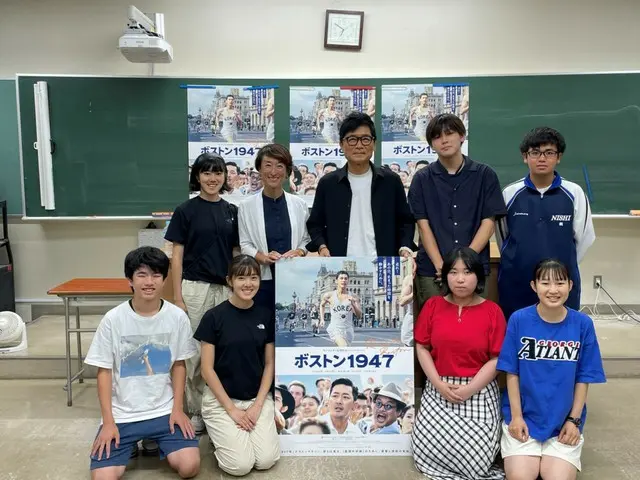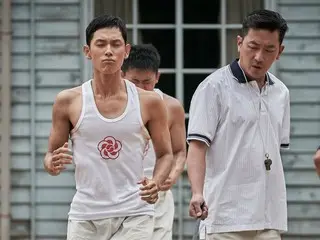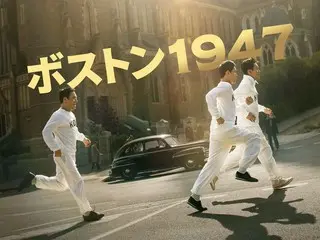Director Kang Je-gyu, who won the award, and Son Eun-kyung, the grandson of Song Ki-jeong, the model for this film, and teachers from Nishi High School, held a special class with students from Nishi High School.
The 2018 Paris Olympics was held on Wednesday, July 31st. Can sports really connect people's hearts across borders? Watching this film during the Paris Olympics is a great way to think about the "nationalism" that is the foundation of the sport.
They discussed what "individual dignity" and "identity" are. On this day, about 10 students and about 15 parents attended. First, Director Kang Je-gyu said, "There are a lot of
I've been here for a while now, but this is my first time at a Japanese high school. I think it's a wonderful opportunity for you to have a discussion on the theme of film at a regular high school, not a film school.
I think this will be useful for the future, and I would like to try something similar in Korea." Next, Song Eun-kyung, the granddaughter of Song Ki-jeong, who was the model for the film,
"I was born and raised in Japan. My father was born and raised in Korea and came to Japan as a graduate student. Every time the Olympics are held, I am interviewed as Song Ki-jeong's grandson.
"I have many opportunities to participate in these events, so I am grateful to have been invited to an event like this," he said. Among the many students who had viewed the work in advance, one male student commented, "I'm impressed by both the sports and history aspects of the work.
I learned a lot from this film, which depicts the way people think. What was your intention in making this film?" Director Jae-gyu responded, "I make films about sports, war, and the future.
I had been thinking about shooting a movie about running, but after watching Chariots of Fire, I wanted to shoot a movie about running. When I was thinking about what to portray, I came across Song Ki-jeong's
"I wanted to depict the harmony between the famous marathon runner, who is also a famous marathon runner, and the other two runners who appear in the film, as they join forces to reach the finish line," he said.
In response, one female student said, "As a Japanese person, I felt the pain of Mr. Song's ordeal, but I was also moved by the fact that the three of them joined forces to raise the flag of their country.
When asked, "What was the reaction in Korea when you achieved success with the film?" Director Jae-gyu replied, "It was two years after the end of Japanese colonial rule, and the country was still socially and politically unstable.
It was a time when governance was not being done properly. In the midst of all this, the country was divided ideologically, and there were many opposing opinions within the country, and people were wondering how they should live their lives from now on.
It was a time when we were lost. In that time, winning a gold medal at the international Boston Marathon meant that Korea's name could be noticed from the world.
"By showing that this was possible, the people were able to gain confidence, and it was an event that gave South Korea great power and dreams."
When asked how Song Ki-jeong talked to her family about the Berlin Olympics and the Boston Marathon, Wook-kyung said, "I didn't really explain it to them.
I never had a conversation in my daily life about what my grandfather thought, but when I was struggling with my identity, I felt like asking him about it.
However, my grandfather avoided my questions and didn't tell me the truth, but now I regret that I didn't tell him more."
"I think he was really happy at the moment he won. But after that, he hit rock bottom, just like in the movie.
He never criticized books or Korea. Japan-Korea relations are always a hot topic, but my grandfather always said, "Japan is bad, but Korea is bad too."
However, the last thing he said before he died was, "I wanted to run in the Hakone Ekiden." Despite winning the gold medal, Song Ki-jeong was barred from participating in the marathon by the Japanese government.
The movie also depicted how children were banned from participating in the Berlin Olympics, so the audience was left speechless by his final words. One of the parents in attendance commented, "I'm glad that this happened at the Berlin Olympics.
I had no idea that such a thing had happened. In response to the question, "What do you want to convey to Japanese audiences in particular through this film?" Director Jae-gyu replied, "When I was making the film,
When I was making the film and when it was released in Korea, I felt that people, especially the younger generation, are all interested in the future, but not many of them are very interested in the past.
Only by looking back at the past can you see your true future and your direction. The past, present, and future are not separate but are on one axis, so if you look back at the past,
I think that by doing so, we can pave the way for a better future. If you watch it from the perspective of what it would be like if you were in that situation, you will be able to see it in a different light.
"The Korean people at that time were facing the loss of their country," he said. A former alumnus and former track and field athlete said, "I was particularly moved by the 'feelings of the people' in this film.
In response to a question from a fan of Director I, "What kind of work do you want to shoot in the future?" Director Jaegyu replied, "The 21st century in which we live is no longer normal.
For example, I would like to portray how we can change our lives from a broad perspective, through the story of the Earth being ruined by people's egos."
Finally, Eun Kyung said, "Many of my personal values were cultivated during my time as a student, just like you. When I look back on my life as an adult, I realize that I have changed in many ways.
I think you will notice it. I want you to treasure the things you feel when you watch this movie." Director Jae-gyu then said, "I want you to broaden your interests.
From our neighbors to our neighbors, and from our neighbors to the world. If things continue like this, society and individuals will become unhappy. If we don't care, misunderstandings will arise, we won't be able to understand each other, and conflicts will break out.
"You will develop and broaden your interests beyond yourself. I think that will lead to your future," he advised, and the students listened intently to his advice as the Q&A session concluded.
"Boston 1947" will be released nationwide from Friday, August 30th at Shinjuku Musashino-kan, Human Trust Cinema Yurakucho, and other theaters.
Directed and written by Kang Je-gyu Co-written by Lee Jeong Hoo
:Ha Jung Woo, Lim Siwan, Bae Seon Woo, Kim Sang-ho, Park Eunbi (LADIES' CODE) 2023/Korea/108min/Scope/5.1ch/Japanese subtitles: Nemoto Rie/G/Original title: 1947
Boston/Distribution: Shogate 1947boston.jp/ © 2023 LOTTE ENTERTAINMENT & CONTENT ZIO Inc. &
BAENTERTAINMENT & BIG PICTURE All Rights Reserved
月30日(金)より公開!衝撃と感動の実話『ボストン1947』予告映像
月30日(金)より公開!衝撃と感動の実話『ボストン1947』予告映像
2024/08/05 13:00 KST
Copyrights(C)wowkorea.jp 5



![[Official Report] Special class discussion on the film "Boston 1947" at Tokyo Metropolitan Nishi High School](/img/news/90/450182/347173_tmb.webp)

![[Official] “17th Asian Film Awards” nominees announced… “Spring in Seoul” has the most nominations](/img/news/83/419721/311887_tmb.webp)

